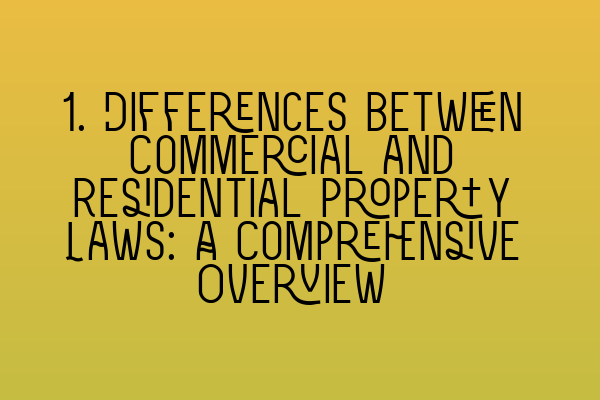When it comes to property law, there are various aspects to consider, and one of the most crucial differentiations is between commercial and residential property laws. Understanding the differences between these two branches of law is essential for property lawyers, real estate professionals, and individuals who are looking to invest in properties. In this comprehensive blog post, we will provide you with an in-depth overview of the differences between commercial and residential property laws.
1. Definition and Purpose
Commercial Property Law: Commercial property law deals with properties that are primarily used for business or investment purposes. This includes properties such as offices, retail stores, industrial spaces, and warehouses. The main purpose of commercial property laws is to regulate commercial transactions and ensure proper conduct in business-related property dealings.
Residential Property Law: Residential property law, on the other hand, focuses on properties that are primarily used for residential purposes. This includes houses, apartments, and condominiums. The main purpose of residential property laws is to protect the rights of individuals who live in these properties and regulate the relationship between landlords and tenants.
2. Legal Frameworks
Commercial Property Law: Commercial property laws are governed by a combination of statutory regulations and common law principles. The legal framework includes acts and regulations specific to commercial properties, such as lease agreements, zoning regulations, and tax laws. Additionally, commercial property laws involve more complex contractual arrangements, negotiations, and considerations compared to residential property laws.
Residential Property Law: Residential property laws are primarily governed by residential tenancy acts and regulations. These laws outline the rights and responsibilities of both landlords and tenants, including rent control, eviction processes, maintenance obligations, and dispute resolution procedures. Residential property laws also address issues related to affordable housing, fair housing practices, and tenant protections.
3. Leases and Tenancy Agreements
Commercial Property Law: Commercial leases and tenancy agreements are generally more intricate and detailed compared to residential leases. They often involve long-term leases, extensive negotiations, and complex provisions related to rent, maintenance, repairs, and use of the property. Commercial leases also often include clauses related to business operations, zoning compliance, insurance coverage, and subletting.
Residential Property Law: Residential leases and tenancy agreements tend to be more standardized and straightforward. These agreements typically include provisions related to the rental amount, duration, security deposits, tenant obligations, landlord responsibilities, and notice periods for termination. Residential property laws often prioritize the protection of tenants, ensuring their rights are safeguarded.
4. Landlord and Tenant Rights
Commercial Property Law: In commercial property law, there is generally more freedom for landlords and tenants to negotiate their rights and responsibilities. The lease agreements provide a framework for the relationship between the parties, and the terms can be tailored to suit their specific requirements. Commercial tenants also often have more business-related concerns, such as the ability to make alterations to the property to accommodate their operations.
Residential Property Law: Residential property laws prioritize the rights and protections of tenants. Landlords are subject to strict regulations when it comes to issues such as rental increases, evictions, and maintenance obligations. Residential tenants have the right to live in a habitable environment, and landlords are legally required to address any necessary repairs or issues that may affect the tenant’s well-being.
5. Dispute Resolution
Commercial Property Law: Disputes in commercial property law are usually resolved through negotiation, mediation, or commercial arbitration. The parties often have established legal teams and professionals to assist in resolving any conflicts that arise. Commercial lease agreements often include specific dispute resolution clauses, which outline the process for resolving disagreements.
Residential Property Law: Disputes in residential property law are usually resolved through administrative agencies, such as the tenancy board or housing authorities, or through small claims court. These dispute resolution processes are designed to be accessible and affordable for tenants and landlords who may not have the resources for a more formal legal process.
Conclusion
In summary, commercial and residential property laws have distinct differences that stem from their different purposes and legal frameworks. Commercial property laws focus on business transactions and investments, while residential property laws prioritize the rights and protections of individuals who live in these properties. Understanding these differences is essential for property lawyers and real estate professionals to provide the best possible legal advice and guidance to their clients.
If you are preparing for the SQE exams and want to enhance your legal knowledge in property law and other areas, SQE Property Law & Land Law can provide you with comprehensive preparation courses. Check out our related articles for more information:
